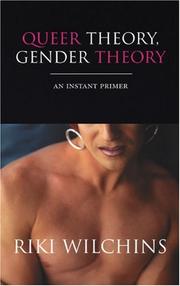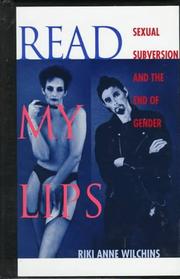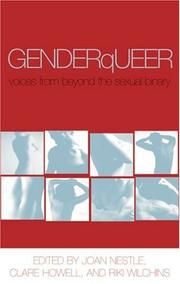| Listing 1 - 10 of 10 |
Sort by
|

ISBN: 1555837980 Year: 2004 Publisher: Los Angeles, Calif. Alyson
Abstract | Keywords | Export | Availability | Bookmark
 Loading...
Loading...Choose an application
- Reference Manager
- EndNote
- RefWorks (Direct export to RefWorks)
Sociology of the family. Sociology of sexuality --- Gender --- Transgender --- Homosexuality --- Queer --- Postmodernism --- Theory --- Bisexuality --- Book --- Derrida, Jacques --- Butler, Judith --- Foucault, Michel

ISBN: 1563410907 Year: 1997 Publisher: Ithaca (N.Y.) : Firebrand books,
Abstract | Keywords | Export | Availability | Bookmark
 Loading...
Loading...Choose an application
- Reference Manager
- EndNote
- RefWorks (Direct export to RefWorks)
Book
ISBN: 1626016240 9781626016248 Year: 2022 Publisher: Bronx, N.Y. : Magnus Books,
Abstract | Keywords | Export | Availability | Bookmark
 Loading...
Loading...Choose an application
- Reference Manager
- EndNote
- RefWorks (Direct export to RefWorks)
"Originally published in 2004, Queer Theory, Gender Theory: An Instant Primer is a classic of LGBTQ+ literature and is taught in most gender studies programs throughout the United States. It was the first book to offer a one-stop, no-nonsense introduction to the core of postmodern theory, particularly its impact on queer and gender studies and is still powerfully relevant today. Nationally-known gender activist Riki Wilchins combines straightforward prose with concrete examples from LGBTQ+ and feminist politics, as well as her own life, to guide the reader through the foundational ideas of Derrida, Foucault, and Judith Butler that have forever altered our understanding of bodies, sex and desire. This is that rare postmodern theory book that combines accessibility, passion, personal experience and applied politics, noting at every turn why these ideas matter and how they can affect your daily life." --
Homosexuality --- Bisexuality --- Gender nonconformity --- Gender identity --- Postmodernism --- Queer theory
Book
ISBN: 9781626010895 Year: 2014 Publisher: Bronx, New York : Magnus Books,
Abstract | Keywords | Export | Availability | Bookmark
 Loading...
Loading...Choose an application
- Reference Manager
- EndNote
- RefWorks (Direct export to RefWorks)
"A one-stop, no-nonsense introduction to the core of postmodern theory, particularly its impact on queer and gender studies. Nationally known gender activist Riki Wilchins combines straightforward prose with concrete examples from LGBT and feminist politics, as well as her own life, to guide the reader through the ideas that have forever altered our understanding of bodies, sex and desire. This is that rare postmodern theory book that combines accessibility, passion, personal experience and applied politics, noting at every turn why these ideas matter and how they can affect your daily life."--Back cover.
Homosexuality. --- Bisexuality. --- Gender nonconformity. --- Gender identity. --- Postmodernism. --- Queer theory.
Book
ISBN: 9781936833641 Year: 2013 Publisher: Riverdale, NY : Magnus Books,
Abstract | Keywords | Export | Availability | Bookmark
 Loading...
Loading...Choose an application
- Reference Manager
- EndNote
- RefWorks (Direct export to RefWorks)
"Read My Lips burst on the scene in 1997 without precedent. It was unique, radical, endearing, outrageous, and very funny. It stood the orthodox academic and medical theories about transexuals on their heads. At last, a trans-intellectual built a theoretical foundation of transgenderism in accessible language, and, most importantly, laid out the tools to fight back against gender oppression. Now re-published as a canon of trans-writing—a book that has influenced queer academics and genderqueer folk everywhere for more than fifteen years—its message remains radical." --
Transgender people --- Lesbians --- Gender identity --- Gender nonconformity. --- Wilchins, Riki Anne,
Book
ISBN: 9781626015654 1626015651 Year: 2020 Publisher: Riverdale, NY : Riverdale Avenue Books,
Abstract | Keywords | Export | Availability | Bookmark
 Loading...
Loading...Choose an application
- Reference Manager
- EndNote
- RefWorks (Direct export to RefWorks)
"Perhaps more than any other issue, gender identity has galvanized the queer community in recent years. The questions go beyond the nature of male/female to a yet-to-be-traversed region that lies somewhere between and beyond biologically determined gender. In this groundbreaking anthology, first published nearly two decades ago, three experts in gender studies and politics navigate around rigid, societally imposed concepts of two genders to discover and illuminate the limitless possibilities of identity. Thirty first-person accounts of gender construction, exploration, and questioning provide the groundwork for cultural discussion, political action, and even greater possibilities of autonomous gender choices." --
Homosexuality. --- Lesbians --- Gender identity --- Gender nonconformity. --- Gender-nonconforming people. --- Transgender people. --- Gender identity. --- Identity.
Book
ISBN: 9781626013681 1626013683 9781626013674 1626013675 Year: 2017 Publisher: Riverdale, NY : Riverdale Avenue Books,
Abstract | Keywords | Export | Availability | Bookmark
 Loading...
Loading...Choose an application
- Reference Manager
- EndNote
- RefWorks (Direct export to RefWorks)
"In the early 1990s, no one talked about transgender people, and no one knew one. We were not on TV or in movies. What formed the visible part of the transcommunity – overwhelmingly white, urban, and middle class – was also overwhelmingly focused on conferences, surgery or hormones and cisgender acceptance. This was still a determinedly non-political population, often in defensive crouch because it was also constantly under attack by the media, police, local legislatures, feminists and even LGB-but-never-T advocates. We were a group that still thought of ourselves as a collection of separate individuals, not a movement. What made political consciousness so difficult was that there was no "transgender section” of town, where we saw each other regularly. And mainstream society mostly ignored us. And when it didn’t, it usually made clear it despised us. We were freaks. We were gendertrash. We lived in a transient and indoor community that knew itself only a few days at a time during conferences at hotels out on the interstate. But all that was about to change. Even when politics are avoided, bringing despised and marginalized people together is itself a political act. Without realizing or intending it, the community was reaching critical mass. Even in those pre-Internet, pre-cellphone days, enough transpeople were running into one another often enough to begin realizing we could be a force, that we didn’t really need cisgender acceptance. What we needed was our civil rights. This is the inside story of how in just a few years, a handful of trans activists would come together in the face of enormous difficulties and opposition to launch from the very margins of society what would grow into the modern political movement for gender rights." --
Transgender people --- Intersex people --- Gender identity. --- Gay rights --- Gay liberation movement --- Sexual minorities --- Sexual minorities in mass media. --- Transgender people. --- Intersex people. --- Gay rights. --- Gay liberation movement. --- Political activity

ISBN: 1555837301 Year: 2002 Publisher: Los Angeles Alyson Books
Abstract | Keywords | Export | Availability | Bookmark
 Loading...
Loading...Choose an application
- Reference Manager
- EndNote
- RefWorks (Direct export to RefWorks)
Fonds Suzan Daniel (FSD)
Book

ISBN: 9780231546102 0231546106 9780231185325 0231185324 9780231185332 0231185332 Year: 2019 Publisher: New York, NY
Abstract | Keywords | Export | Availability | Bookmark
 Loading...
Loading...Choose an application
- Reference Manager
- EndNote
- RefWorks (Direct export to RefWorks)
"What happens when your gender doesn't fit neatly into the categories of male or female? Even mundane interactions like filling out a form or using a public bathroom can be a struggle when these designations prove inadequate. In this groundbreaking book, thirty authors highlight how our experiences are shaped by a deeply entrenched gender binary. The powerful first-person narratives of this collection show us a world where gender exists along a spectrum, a web, a multidimensional space. Nuanced storytellers break away from mainstream portrayals of gender diversity, cutting across lines of age, race, ethnicity, ability, class, religion, family, and relationships. From Suzi, who wonders whether she'll ever feel like a woman after living fifty years as a man, to Aubri, who grew up in a cash-strapped fundamentalist household, to Sand, who must reconcile the dual roles of trans advocate and therapist, the writers' conceptions of gender are inextricably intertwined with broader systemic issues. Labeled gender outlaws, gender rebels, genderqueer, or simply human, the voices in Nonbinary illustrate what life could be if we allowed the rigid categories of man and woman to loosen and bend. They speak to everyone who has questioned gender or has paused to wonder, What does it mean to be a man or a woman-and why do we care so much?" --
Gender nonconformity. --- Gender-nonconforming people. --- Sexual minorities --- Gender identity. --- Sex identity (Gender identity) --- Sexual identity (Gender identity) --- Identity (Psychology) --- Sex (Psychology) --- Queer theory --- Gender-creative people --- Gender-independent people --- Gender-non-normative people --- Gender-variant people --- Genderqueer people --- Non-binary people --- Persons --- Gender variance (Gender nonconformity) --- Genderqueer --- Non-binary gender --- TGNC (Transgender and gender nonconformity) --- Transgenderism --- Gender expression --- Gender identity --- Identity. --- Gender nonconforming people. --- Gender dysphoria
Digital

ISBN: 9780231546102 9780231185332 Year: 2019 Publisher: New York, N.Y. Columbia University Press
Abstract | Keywords | Export | Availability | Bookmark
 Loading...
Loading...Choose an application
- Reference Manager
- EndNote
- RefWorks (Direct export to RefWorks)
| Listing 1 - 10 of 10 |
Sort by
|

 Search
Search Feedback
Feedback About UniCat
About UniCat  Help
Help News
News